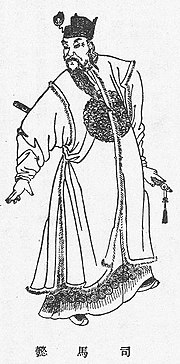Sima Yi
| Sima Yi | |
|---|---|

A Qing dynasty illustration of Sima Yi
|
|
| General, politician, regent of Cao Wei | |
| Born | 179 |
| Died | 7 September 251 (aged 71–72) |
| Successor | Sima Shi |
| Names | |
| Traditional Chinese | 司馬懿 |
| Simplified Chinese | 司马懿 |
| Pinyin | Sīmǎ Yì |
| Wade–Giles | Szŭ-ma I |
| Courtesy name | Zhongda (simplified Chinese: 仲达; traditional Chinese: 仲達; pinyin: Zhòngdá; Wade–Giles: Chung-ta) |
| Posthumous name |
|
| Temple name | Gaozu (Chinese: 高祖; pinyin: Gāozǔ; Wade–Giles: Kao-tsu) |
Sima Yi (179 – 7 September 251), courtesy name Zhongda, was a general and politician of the state of Cao Wei in the Three Kingdoms period. He is perhaps best known for defending Wei from Zhuge Liang's Northern Expeditions. His success and subsequent rise in prominence paved the way for his grandson Sima Yan's founding of the Jin dynasty, which would eventually bring an end to the Three Kingdoms era. In 265 after the Jin dynasty was established, Sima Yi was posthumously honoured as Emperor Xuan of Jin with the temple name of Gaozu.
Sima Yi was one of eight brothers, all of whom were famous due to their lineage. Each of them had a courtesy name ending with the character Da (達). Because of this, the brothers were known collectively as the "Eight Da of Sima" (司馬八達). This was a term of respect, as other groups of eight talented administrators in previous eras had been referred to in this way. His family resided in Luoyang when Dong Zhuo occupied the city, destroyed it, and moved the capital to Chang'an. Sima Yi's elder brother Sima Lang led the family to their ancestral home in Wen County (温縣; present-day Wen County, Henan), and then, correctly predicting that it would become a battlefield, moved them again to Liyang (黎陽; present-day Xun County, Hebi, Henan). In 194, as Cao Cao battled Lü Bu, Sima Yi accompanied his family back to Wen County.
...
Wikipedia
